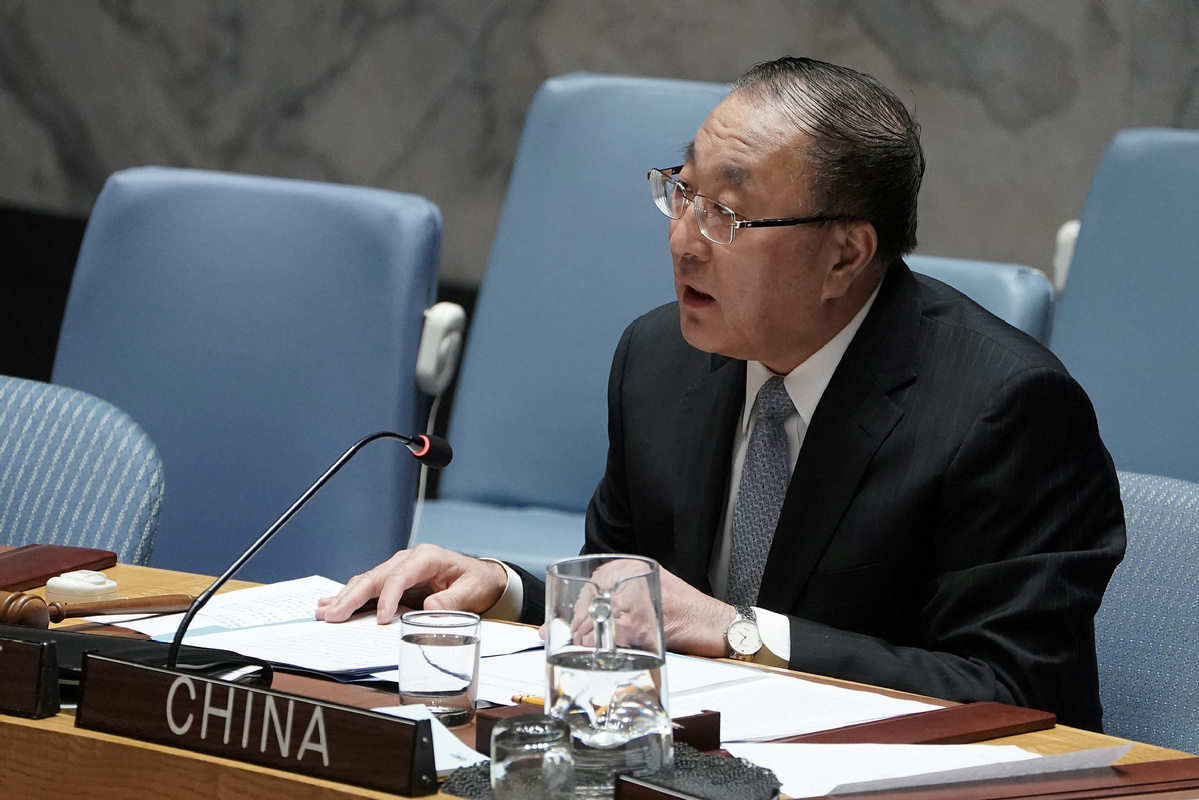Sanctions won't help solve peninsula issue, China says
By MINLU ZHANG at the United Nations | chinadaily.com.cn | Updated: 2022-05-27 16:08

China's top envoy to the United Nations reiterated on Thursday that sanctions will not help solve the nuclear issue on the Korean Peninsula, but rather will lead to escalation of confrontation.
The UN Security Council earlier that day failed to adopt a United States draft resolution that sought to impose additional sanctions on the Democratic People's Republic of Korea. The Chinese delegation has voted against the draft.
"China has been calling on all parties to exercise calm and restraint, and to desist from actions that could increase tensions and lead to miscalculations," explained Zhang Jun, China's permanent representative to the UN, after the vote.
Zhang said the council should play a positive and constructive role, and its actions should help de-escalate the situation and prevent it from deteriorating or even getting out of control.
"Facts have proved that dialogue and negotiations are the only viable way to solve the problem. The US, as a main stakeholder in the peninsula question, is directly responsible for promoting dialogue and negotiations," he said.
"The situation on the peninsula has developed to what it is today, primarily due to the flip-flop of the US policies and its failure to uphold the results of previous dialogue. This is an undeniable fact."
Facts have also shown that reliance on sanctions will not help resolve the peninsula issue, he said.
The ambassador said countries concerned should not place one-sided emphasis on the implementation of sanctions alone, but should also work to promote a political solution and ease sanctions where appropriate.
He pointed out that additional sanctions will only lead to more negative effects, escalation of confrontation, and cause greater humanitarian impact. The goal should be to promote dialogue and negotiations, and create a favorable environment for political solution.
Zhang noted that the US has been vigorously promoting the Indo-Pacific strategy, "which is necessarily linked to the latest developments on the peninsula".
The US' moves have all "sent wrong signals and negatively impacted the resolution of the DPRK nuclear issue," Zhang said. "We advise countries concerned to put the international and regional peace and security first, abandon the Cold War mentality, and not to travel further and further down the wrong path," he added.
"China once again calls on all parties to exercise calm and restraint, and calls on the US side to seriously reflect on its policy toward the DPRK, adhere to the general direction of political settlement, take meaningful actions to respond to the legitimate and reasonable concerns of the DPRK, and create conditions for the de-escalation of the situation and the resumption of dialogue and negotiations."
Zhang also rejected accusations against China's position from the US ambassador to the UN.
"China has been a responsible member of the Council, engaging in the Council's work responsibly, and working hard to maintain the unity of the Council," he said.
"China's position is independently self-determined, and it does not have to be aligned with that of the United States. Not to mention such alignment is not required in the Council's rules of procedure."
The reason why the draft resolution failed to pass was not China's fault. "In fact, perhaps some people wanted nothing but this situation based on their cynical intentions," he said.
"China's voting position is based on our assessment as to whether a proposal contributes to a solution, whether it helps maintain international and regional peace and security, and whether it can head off greater tensions or a bigger disaster."
The key to solve the Korean Peninsula issue is whether or not someone wants to use the issue as a card for its so-called Indo-Pacific strategy, whether or not they want to use the handling of the issue as a chessman on the chessboard for their so-called Indo-Pacific strategy.
If some people are making other plans deep down with the objective to spread the flames of war to Northeast Asia, to the Korean Peninsula, Zhang said, "China would have no choice but to take stern and firm initiatives to defend the peace and stability of the Korean Peninsula and that of Asia-Pacific, because that is what we have to do in order to fulfill our due responsibility."
























